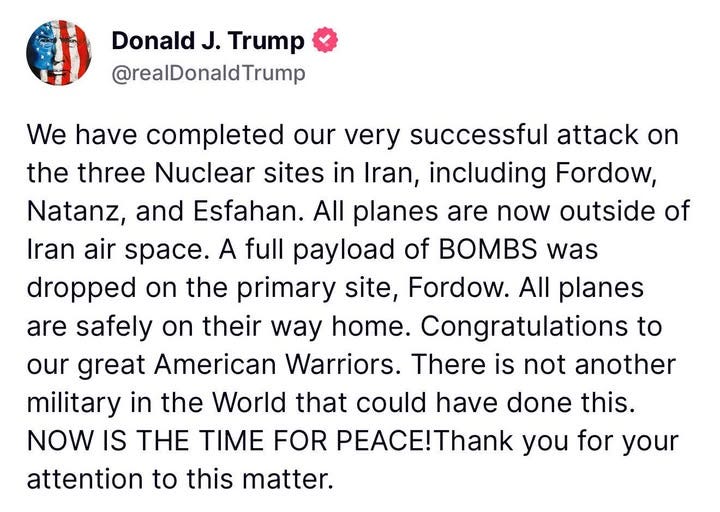Well, it’s happened. The President who ran on not starting any new wars may have very well started one.
"We have completed our very successful attack on the three Nuclear sites in Iran, including Fordow, Natanz, and Esfahan," President Trump wrote on Truth Social yesterday.
I agree it’s time for peace, but I’m not at all sure that peace will result from this attack. So here are some thoughts…
The good.
Iran has been involved in a range of malign activities worldwide. From orchestrating assassination operations, including in the United States, to funding terrorist proxies like Hizballah, the Huthis, HAMAS, and Palestinian Islamic Jihad (PIJ), to human rights violations Iran hasn’t exactly been a well behaved member of the global community. It has been a designated State Sponsor of Terrorism since 1984. The International Atomic Energy Agency (IAEA) several weeks ago raised red flags about Iran’s compliance with international nuclear commitments.
“Iran has repeatedly either not answered” IAEA requests “or not provided technically credible answers,” Mr. Grossi told the 35-nation board on Monday. Additionally, he said, Iran has sought to “sanitise the locations,” which the agency has now concluded were part of a “structured” nuclear programme in the early 2000s.
“Unless and until Iran assists the agency in resolving the outstanding safeguards issues, the Agency will not be in a position to provide assurance that Iran’s nuclear programme is exclusively peaceful,” he said.
Mr. Grossi expressed alarm at the rapid accumulation of over 400 kilogrammes of highly enriched uranium, which has serious implications (highly enriched uranium is one of the necessary components for the creation of a nuclear bomb).
Given Iran’s other activities, it’s not unreasonable to assess that if it did acquire a nuclear bomb, it would not just destabilize the Middle East region, but would also not hesitate to use it against its adversaries, including the United States.
So maybe destroying Iran’s nuclear capability is not a bad idea.
The strike provided the United States with the opportunity to be an active participant in shaping events in the Middle East, including providing enough confidence in US involvement in the region to prevent other countries there from building their own nuclear arsenals.
In addition, maybe this attack will give Tehran pause before they decide to send more Shahed drones and other military materiel to Russia to enable Moscow to continue murdering Ukrainians. They have their own assets to protect.
The bad.
Reuters has reported that a senior Iranian source said that all the stock of enriched uranium at Fordow had been transferred to another location before the US attack. The media reports that satellite images captured a large convoy moving near the underground nuclear facility two days before the attack. That may be confirmation that the claim is true, and if that’s the case, is there penetration of the US intelligence community that forewarned Tehran of the impending attack?
Iran has vowed retaliation. US troops are on high alert. The Huthis have vowed that they would start actively targeting US assets and have called on their terrorist buddies to do the same.
Many lawmakers on both sides of the aisle call the attacks unconstitutional. “The only entity that can take this country to war is the US Congress,” said Senator Bernie Sanders. Some Democrats call the attack an impeachable offense. Even George W. Bush got authorization from Congress under a joint resolution passed in October 2002 to use the US Armed Forces against Saddam Hussein’s government.
The numerous factors cited in the Iraq resolution could also easily be applied to Iran.
Noncompliance with nuclear responsibilities
Noncooperation with the IAEA
“Brutal repression” of the civilian population
Capability to use weapons of mass destruction
Hostility toward the United States
Aid and funding of international terrorist organizations
Bounties paid to terrorists, such as the Haqqanis in Afghanistan, and their families
So why erode the constitutional power of the US Congress to authorize military action?
This is the constitutional crisis that worries me.
Another thought kept me up last night.
Iranian officials, including former foreign minister Kamal Kharazi, who currently serves as an adviser to Supreme Leader Ayatollah Ali Khamenei, last November warned that Iran’s nuclear fatwa issued by Khamenei could change if Iran’s survival comes under threat, and while Iranian Foreign Minister Abbas Araghchi that month reiterated that Iran does not seek nuclear weapons, attacks such as the one last night by the United States and Israel’s attacks since June 13th could be interpreted as a threat to Iran’s survival by the regime.
If Iran does get froggy and launches a direct attack—nuclear or not—against the United States directly, would NATO members come to our aid under Article 5’s collective security guarantee?
Considering Trump’s repeated criticism of our NATO allies, and his remarks a few months ago about possibly refusing to come to the aid of NATO allies in the event of an attack if they “don’t pay,” I have my doubts.
What would this mean for the future of the alliance?
NATO invoked Article 5’s collective security guarantee only once—after the September 11 attacks on the United States. We were attacked. Thousands of our citizens were murdered. Our allies heeded the call. Given that the US attack against Iran’s nuclear facilities was preemptive and the hostile attitude toward our allies by the current administration, I have my doubts.
The intelligence and Gabbard’s pivot.
President Trump sidelined his Director of National Intelligence Tulsi Gabbard, asserting that she was “wrong” when she testified in March that Iran wasn't building a nuclear weapon, and proceeding with the preemptive attack despite her testimony.
Ever the opportunist, Gabbard quickly pivoted to claims that the evil media misrepresented her testimony. This is sure to mend the apparent rift between her and the President. She now says Iran could produce nuclear weapons "within weeks."
Typical.
Here’s the full text of Gabbard’s opening remarks in March regarding Iran and its nuclear missiles from the ODNI website.
Iran continues to seek to expand its influence in the Middle East, despite the degradation to its proxies and defenses during the Gaza conflict. Iran has developed and maintains ballistic missiles, cruise missiles, and UAVs, including systems capable of striking U.S. targets and allies in the region. They've shown a willingness to use these weapons, including during a 2020 attack on US forces in Iraq and in attacks against Israel in April and October 2024. Iran's cyber operations and capabilities also present a serious threat to U.S. networks and data. The IC continues to assess that Iran is not building a nuclear weapon and Supreme leader Khomeini has not authorized the nuclear weapons program that he suspended in 2003. We continue to monitor closely if Tehran decides to reauthorize its nuclear weapons program. In the past year, we've seen an erosion of a decades long taboo in Iran on discussing nuclear weapons in public likely emboldening nuclear weapons advocates within Iran's decision-making apparatus. Iran's enriched uranium stockpile is at its highest levels and is unprecedented for a state without nuclear weapons. Iran will likely continue efforts to counter Israel and press for U.S. military withdrawal from the region by aiding, arming, and helping to reconstitute its loose consortium of like-minded terrorists, actors, which it refers to as its “Axis of Resistance.” Although weakened, this collection of actors still presents a wide range of threats including to Israel's population, U.S. forces deployed in Iraq and Syria, as well as U.S. and international military and commercial shipping and transit.
If Khamenei hadn’t reauthorized the restart of Iran’s nuclear program, how can they be within “weeks to months” of presenting a nuclear weapons threat?
Khamenei hasn’t publicly authorized the start of Iran’s nuclear program. Why would he? With the threat of US and Israel’s attacks hanging over the regime’s head, Iran would be much better off if it kept its nuclear ambitions on the downlow.
Fact is, without some pretty high-level accesses, we simply don’t know whether Iran’s nuclear weapons program has been reauthorized or restarted, and we don’t have the full text of the Intelligence Community’s assessment.
Even Israel’s Prime Minister Benjamin Netanyahu said it could be a year or a few months.
The Israeli military said it had accumulated in recent months intelligence showing that “concrete progress” had been made “in the Iranian regime's efforts to produce weapons components adapted for a nuclear bomb”, including a uranium metal core and a neutron source initiator for triggering the nuclear explosion.
However, Kelsey Davenport, director for non-proliferation policy at the US-based Arms Control Association, told the BBC on Friday that Israel's prime minister “did not present any clear or compelling evidence that Iran was on the brink of weaponizing”.
Two Trump administration officials with knowledge of internal deliberations recently asserted that the president’s decision to strike Iran’s nuclear facilities was not driven by any new intelligence on Iran.
“There is no intel,” says one of the officials, who were granted anonymity to discuss sensitive matters. “Nothing new, that I’m aware of… The president is protecting the United States and our interests, [but] the intelligence assessments have not really changed from what they were before.”
To be fair, Trump also did not claim in his address last night that Iran was close to developing a nuclear weapon.
He pointed to the “massive, precision strikes on the three key nuclear facilities in the Iranian regime. Fordo, Natanz and Esfahan.” He also noted that the US objective was the destruction of Iran’s nuclear enrichment capacity, hindering the nuclear capabilities of “the world’s number one state sponsor of terror.” Vice President JD Vance said the United States was not at war with Iran, but rather “with its nuclear program.”
Does this mean war?
Let’s hope not.
There’s no doubt that this attack was a massive escalation. Iran—despite all the malicious activities that threatened US interests and national security—had not attacked us directly. But now, what will Tehran do to retaliate? Iran has threatened to “reserve all options” to respond to Operation Midnight Hammer. Trump has threatened that Iran’s retaliation “will be met with even greater force than what was unleashed today.”
In his speech last night, Trump reminded Iran that there are “many targets left” to attack and vowed to go after them if Iran refuses peace.
With all of that being said, this cannot continue. There will be either peace, or there will be tragedy for Iran, far greater than we have witnessed over the last eight days. Remember, there are many targets left. Tonight’s was the most difficult of them all, by far, and perhaps the most lethal. But if peace does not come quickly, we will go after those other targets with precision, speed and skill. Most of them can be taken out in a matter of minutes.
If war doesn’t happen, one still has to wonder whether the US Constitution can withstand more pressure from the White House.








You and I both know that “intelligence” is subject to many variables. Be at the collection, analysis, or consolidation, it is always subject to “supervisory” changes as it goes up the line. And none of us know what was actually provided to Gabbard or the president. In all honesty, I believe the strikes were the right thing to do at this time.